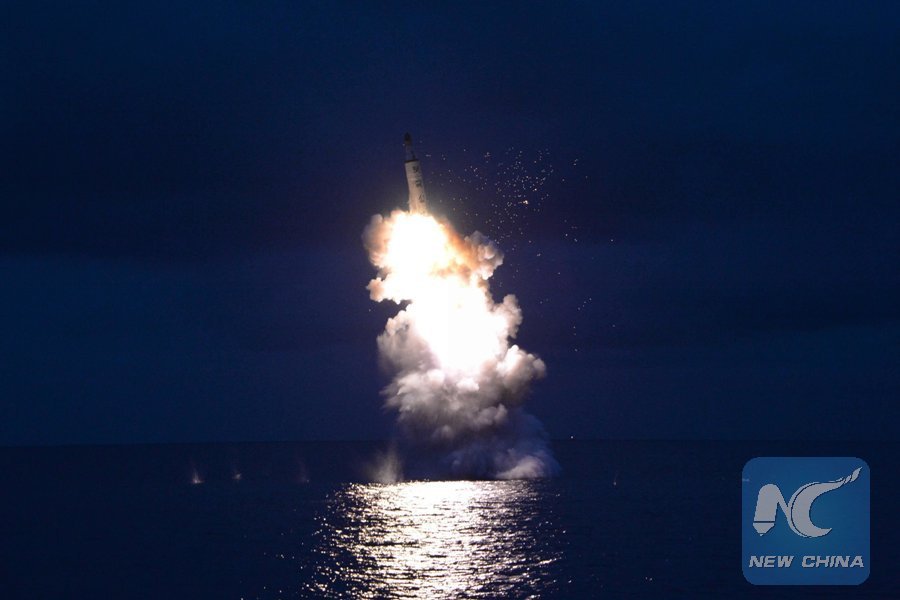
Photo released by Korean Central News Agency (KCNA) on Aug. 25, 2016 shows the scene of a test-firing of a strategic submarine-launched ballistic missile. Top leader of the Democratic People's Republic of Korea (DPRK) Kim Jong Un has recently guided a successful test-firing of a strategic submarine-launched ballistic missile "Pukguksong," the official news agency KCNA reported. (Xinhua/KCNA)
by Yang Shilong
NEW YORK, Aug. 28 (Xinhua) -- The best solution to the Korean Peninsula nuclear issue is still a "negotiation track" as no parties involved can afford a bloody and costly war, experts said.
"The U.S. administration should be in consultation now with Seoul and Tokyo as to what the steps should be after the exercises conclude," said Jenny Town, Assistant Director of the U.S.-Korea Institute, Johns Hopkins School of Advanced International Studies, in a recent interview via email with Xinhua on the heightened tension of the peninsula.
The Democratic People's Republic of Korea (DPRK) Tuesday fired a ballistic missile that passed over Japan.
"Can we come up with a coordinated strategy forward, that incorporates the U.S. and our allies' interests, and moves us away from this cycle of escalation?" Town asked.
Washington and its allies need to enter into talks with the DPRK to seek a possible breakthrough on the longstanding nuclear issue, suggested Town.
"The better solution is still a negotiation track, one where the U.S. objectives are clear and have been formulated in full consultation with Seoul and Tokyo," she said.
"But the bigger point is that we also have to have a mutual understanding among the U.S. and allies as to what we want out of a negotiation process -- what are our objectives and how badly do we want to achieve them, letting those principles guide the process of choosing appropriate carrots and sticks," she noted.
Direct talks with the DPRK may not be "the most palatable option" for the administration under U.S. President Donald Trump, she said, but it is still "preferable over military options that could easily escalate to war."
"The reality is, there may be more 'on the table' than what many 'believe' possible, but we will only know if we actually start a negotiation," she said.
STRATEGIC DECISIONS NEEDED
Robert Hormats, vice chairman of Kissinger Associates, agreed with Town.
"I think there are ways of working with the North Koreans (the DPRK)," Hormats, who served as Under-Secretary of State for Economic Growth, Energy, and the Environment from 2009 to 2013, told Xinhua in an interview at his office in New York City.
"Neither the North nor the South (Korea) nor the American government believes war is the answer to this."
"The cost (of the war) would be so high certainly for both parts of Korea...that would be very, very bloody and create lots of death, a lot of injury, to hundreds and hundreds of thousands of people," Hormats said.
Washington needs "thoughtful people" to make "strategic decisions" in an "orderly process", he noted, as figuring out a diplomatic solution to the peninsula nuclear issue is a "difficult thing to do."
"You can't make strategic decisions using Twitter, you have to have a process where all the agencies come together, develop serious options," Hormats said. "It is not sufficient to have ad hoc decisions... it needs to be a long-term process."
Robert Lawrence Kuhn, chairman of the Kuhn Foundation, believes that the Trump administration's linking China-U.S. trade with the Korean Peninsula nuclear issue is not a reliable strategy.
"Those two would have nothing to do with one another. They are both problems and they both should be solved and they both have kinds of solutions but there's no relationship (between the two)," Kuhn told Xinhua.
Both issues are extremely complex, and linking them together will only bring about more complex challenges, noted the scholar.
The root cause of the Korean Peninsula nuclear issue lies in the mutually strategic suspicions between the DPRK and the United States, said Avery Goldstein, Director of the Center for the Study of Contemporary China at the University of Pennsylvania, in an interview with Xinhua.
Pyongyang is "nervous about the risk" that the United States will threaten it with "regime change," and believes it needs nuclear weapons to "dissuade the U.S. from acting against it," Goldstein said.
Washington has to find ways to change that motivation in Pyongyang, he said.

